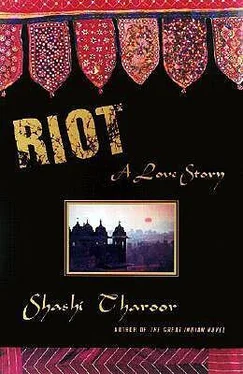And yet I have come to a point where I can no longer imagine a week without Priscilla, let alone a life. When I think of her returning to her unattainable homeland in October, as she is scheduled to do, and when I contemplate resuming the texture of my life before I knew her, I am seized with a wordless panic. And yet the alternative is equally unimaginable. Abandon my solemn responsibilities to my wife, my parents, my daughter, my extended family, her family, our caste? To run away with another woman? An American! And where will we go? To do what?
These are questions that I do not give voice to, but it is clear Priscilla is already contemplating the answers. I am beginning to worry that, like a careless paan eater, I may have bitten off more than I can chew. The paan eater spits out the residue in a long stream that looks like blood. In my case I am afraid to spit out what I have, and my blood churns inside me, thickening like quicksand.
birthday card for Lakshman
July 22, 1989
HAPY BRITHDAY TO THE BESTEST DADDY IN THE HOLE WORLD
I LOVE U XXX REKHA
letter from Priscilla Hart to Cindy Valeriani
July 25, 1989
Cin, I don’t want you to be alarmed or anything, but something a little disturbing happened to me today. You remember I mentioned a Muslim woman, Fatima Bi, who the extension worker from the Center took me to? The one with the seven kids, all scrawny and malnourished and wallowing in the dust, whose husband was refusing to let her use any protection? Kadambari, the extension worker, took me along to meet her so I could see at first hand the problems we’re facing. The woman’s exhausted from childbearing and child-rearing; she subsists in a hovel in the Muslim quarter — I nearly wrote “ghetto” — and she basically has no life. She’s shut up in this dank shuttered apartment in an enclosed building off a lane that’s basically an open sewer. (I thought I knew India from my years in Delhi, Cin, but to know India you’ve also got to come to a town like Zalilgarh and smell India.) Anyway, she’s covered from head to toe in traditional garb — a long robe leaving only her face bare, but she also wears a scarf over her head, and I bet she has to put on a burqa when she goes out, if she ever does, poor thing. Fatima Bi’s a thin, bucktoothed little woman with a prominent mole and an expression of chronic anxiety. She lives with her husband and seven kids in a two-room flat, cooks in the corner of one of the rooms on an open stove, uses a communal bathroom, washes their clothes at a public tap, and suffers the demands and the blows of her husband, to judge by a visibly bruised cheek.
Her husband’s some sort of government employee, believe it or not, a chauffeur or something in one of the municipal offices here in Zalilgarh. His name’s Ali. The man’s actually proud of his seven children and says they’re a testament to his virility. When poor Fatima Bi suggested that they couldn’t afford any more he took that as a personal insult and beat her up. The woman says that what Ali brings home isn’t enough to feed and clothe three children properly, let alone seven. So, at my suggestion, Kadambari and I gave her some condoms last week from the Center’s demonstration stocks.
Bad idea. Of course he won’t wear them — in fact it made him so angry when Fatima offered the package to him that he beat her up again and called her a filthy whore for even knowing that such things existed. Of course he also asked where she’d got them from and when she told him, he forbade all contact between her and the Center. Remember, she’s one of the women who’d never be caught dead coming to the Center — that’s why the Extension Worker goes to her. But to reinforce the message he came to the Center and demanded to see Kadambari and me. It was Wery unpleasant, as poor Mr. Shankar Das put it. Ali shouted at us, the veins in his throat throbbing in his fury, and told us never to darken his door again. Kadambari was a little scared, I could see that, but I started to say that it was his wife’s right to have as much information as she needed to decide how to conduct her life. Boy, was that a dumb thing to do! Ali hit the roof. “I decide how my wife conducts her life!” he screamed. “Not her! And certainly not you!” (adding a few choice epithets in Urdu about me that Mr. Das asked Kadambari not to translate). And then he flung the packet of condoms in my face and stormed out.
It was all very upsetting, Cin, even though Mr. Das and Kadambari and all the others did their best to help me calm down. Women like Fatima are the very reason population-control awareness is so important; it’s the whole reason I do what I’m doing. But I think of that poor thin woman being beaten by her husband because of what I told her she could do. I haven’t empowered her in any way, and I’ve probably made things worse for someone whose life is miserable enough as it is. And I haven’t done myself any favors either. That look of pure hatred on Ali’s face was frankly terrifying. In the instant that he flung those condoms at me, I knew he would have done the same thing if he’d happened to be holding a stone, or a knife.
Oh, don’t worry too much, Cindy. I’m probably just being a little melodramatic — the hysterical foreign woman in India, one of the long line starting with E. M. Forster’s Adela Quested. I wanted to talk to Lucky about it when I saw him tonight, but all he wanted was to make love! (Which was very pleasant, and helped me feel a lot better….)
transcript of Randy Diggs interview with
District Magistrate V. Lakshman (Part 2)
October 13, 1989
It was exactly as we’d feared. The crowd now began to fan out in every direction, and many rushed straight to the Muslim bastis. I immediately ordered curfew. As the mob was running past, I went onto the mobile wireless to instruct the police and the magistrates who were already on duty in pickets at all sensitive points in the town, to impose curfew with a firm hand in the shortest possible time.
“Do I use force if necessary?” one asked.
“You may take whatever measures involving the use of force you deem necessary,” I replied firmly, “including resort to firing, if need be.” I repeated that phrase a few more times to others.
Guru — the SP — and I jumped into the SP’s jeep and drove straight to the “communally sensitive” bastis, the Muslim quarters. Things were bad already. The SP himself fired several rounds. From reports at the end of the day I learned that the police resorted to firing at three other places. But it worked. Curfew was fully imposed in the town in the brief space of twenty minutes.
However, even in these twenty minutes, seven lives were lost and scores of people injured, about a hundred Muslim houses and commercial establishments set ablaze, three mosques desecrated. Six of the deaths were caused by the daggers and other weapons carried by the mobs assaulting the Muslim bastis, including a country-made rifle. These six dead were all Muslims. One of them was a boy who brought me my tea at the office sometimes. I would always complain that he put in too much sugar. The others used to call him Mitha Mohammed, Sweet Mohammed. He was always grinning, from ear to ear. They slit his throat with a dagger, and when I saw the body, the crooked line across his skin looked like a smile.
One Hindu died, too. He was killed by the bomb thrown by the Muslim extremists who fled, and who were largely arrested within minutes. Several dozen injured were rushed to hospitals.
Seven deaths in total. The figures had been much worse elsewhere; Zalilgarh had escaped relatively unscathed. I suppose I knew I would be congratulated for my handling of the situation. There were forty-seven injured, though, and lakhs of rupees of damaged property. I didn’t know about Priscilla yet. But I felt no relief at all at the end of the day.
Читать дальше












